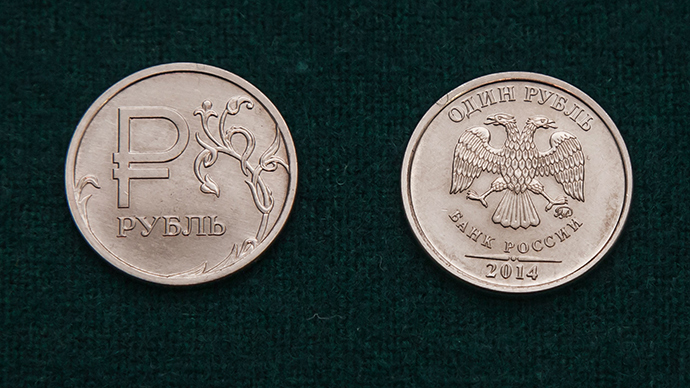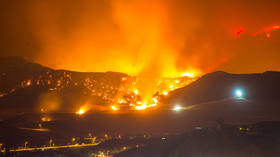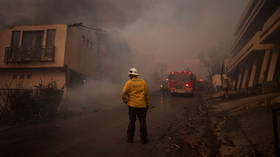Solstice searching: On market panics & currency collapse

The shortest day of the year is almost at hand. The longest night of worry for Russia’s economy is already upon us. Despite financial storm clouds which threaten international contagion, there is still hope.
In financial markets the equilibrium between calm and panic can prove precarious when confidence evaporates. The Russian ruble has just endured the most bruising month in its history. The Central Bank’s decision to let the currency float freely has resulted in a savage decline greater than anybody expected.
The resultant fear, verging on outright panic is understandable. Russians are perhaps the world’s most acutely aware citizens when it comes to foreign currency rates. Every city is replete with neon signs advertising real time prices from a myriad of moneychangers.
The oil price collapse alongside a Russian budget predicated upon $100 a barrel began the ruble’s tumble (sanctions didn’t help) before the recent extreme dislocation took hold. Raising interest rates overnight from 10.5 to 17 percent merely induced a currency meltdown. 100 rubles to the euro is in plain sight as I type.
Anybody rejoicing in Russia’s problems ought to beware what they wish for: such a massive dislocation in one currency could easily lead to international contagion…(bonds as far as Turkey and Ghana have already suffered!).
Market panics promote negative headlines. Investors were spooked by this week’s sudden downturn in Chinese Industrial production. Meanwhile, recent ‘conventional wisdom’ of perpetual $100 oil has become conviction we face a semi-permanent energy price plateau.
Clearly difficult waters lie ahead for the Russian economy amongst others (elsewhere, default in both Venezuela and the haplessly feudal Ukrainian economy, are increasingly certain). However Russian default threats remain remote. Some corporates, exacerbated by sanctions locking Russian borrowers out of US markets, could suffer discomfort repaying dollar debts as early as this month. However, Russia itself has palpably minuscule overall debt - barely 10 percent of GDP...only Estonia has a lower ratio in Europe - Italy owes a dozen times more per head! The ruble was left floating to preserve Russia’s $415 billion in reserves. Hence a significant default cushion remains. Capital controls must be avoided - they are largely unworkable within the rather porous Russian environment.

Nevertheless, Russia has a trade balance Achilles heel: it’s overly dependent on raw commodities. Oil and gas constitute 67 percent of exports / 50 percent of government revenues. That is unsustainable, especially with oil prices 50 percent down from their June peak. However, a key issue is how long oil can stay this low. Storm clouds (literally and physically!) are growing off the Western European coast threatening a possible once in a generation prolonged cold snap (and America’s winter has already endured some extremes). Energy prices could reverse upwards sharply as demand kicks back. It is increasingly clear the current OPEC production tussle seeks to flood oil markets to squeeze shale producers. True, it won’t impact many Dakota Bakken fields with $42 production (or less), but it will shake out a great many leveraged smaller ‘non-conventional’ US drillers whose marginal cost of production is massively higher - that impacts ‘expensive’ tar sands too.
A great many reasons exist to suggest oil prices could bounce back even by the middle of 2015 as supplies are squeezed back to a more comfortable equilibrium for OPEC.
At least in the interim, Russia will be subject to a fairly brutal shock (with quasi-global contagion risks). The Russian Central Bank suggests a 4.7 percent annual GDP collapse if oil stays at $60 per barrel (worse if it keeps falling).
This isn’t 1998 where Russia defaulted when reserves dwindled to $15 billion. Nevertheless a clear whiff of palpable fear is in the air, perturbing consumers ahead of the Festive Season. Imported goods prices will soon skyrocket when new imports arrive. That dislocation will harm many (small) merchants.
Politicians would be well advised to grasp the nettle and endorse changes to accelerate Russia’s road away from Soviet economic failure. Re-energizing Russian the entrepreneurs and innovators of Russia is required to invigorate export industries. The nation has an incredible talent pool which must be encouraged to increase production of everything from under-productive agriculture to exploiting the many great technology I explored at the Moscow Open Innovation Forum this year.
Russia must accelerate painful treatment to make the economy more flexible and productive. Right now things look bleak, but it is always darker before the dawn.
The bear is wounded, but rumors of its death have been greatly exaggerated.
The statements, views and opinions expressed in this column are solely those of the author and do not necessarily represent those of RT.
The statements, views and opinions expressed in this column are solely those of the author and do not necessarily represent those of RT.













